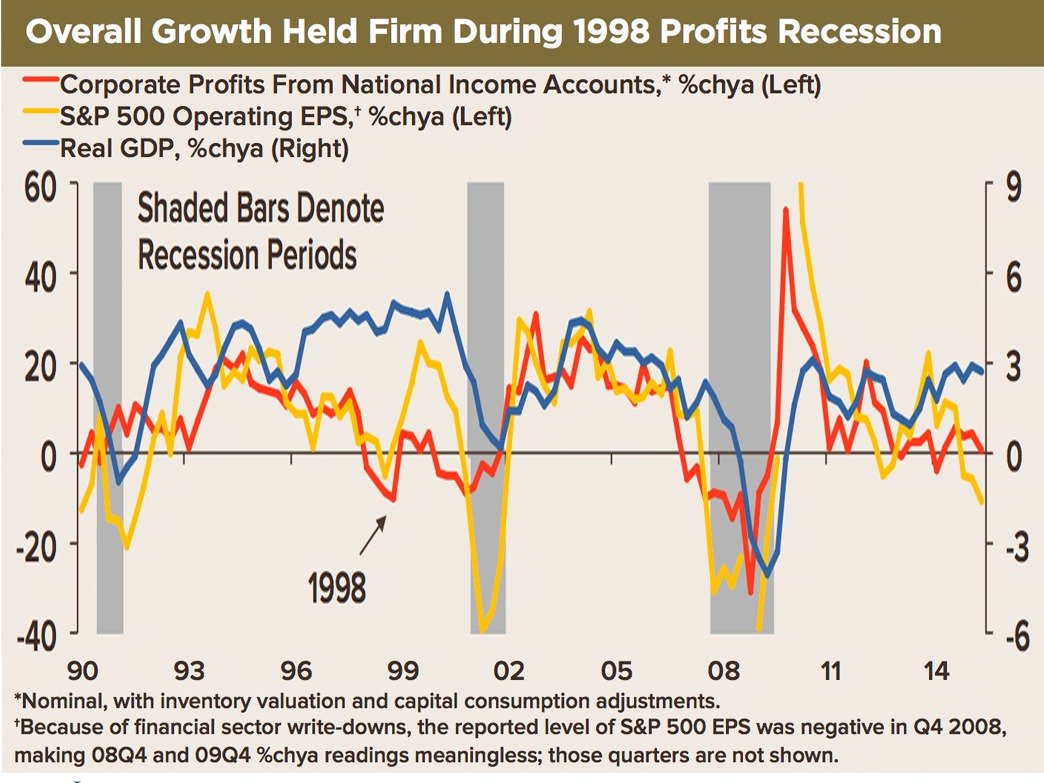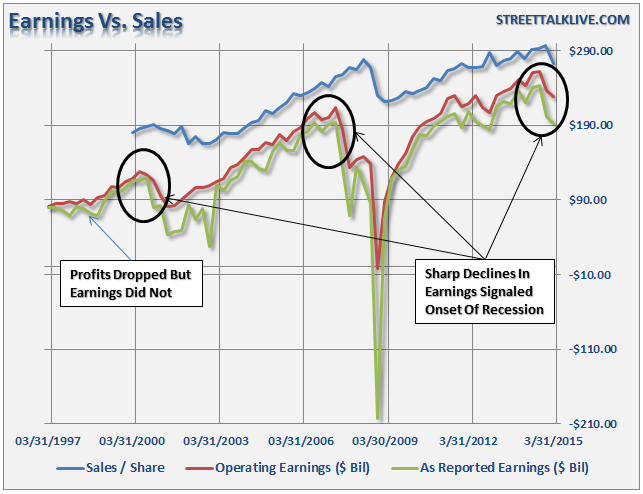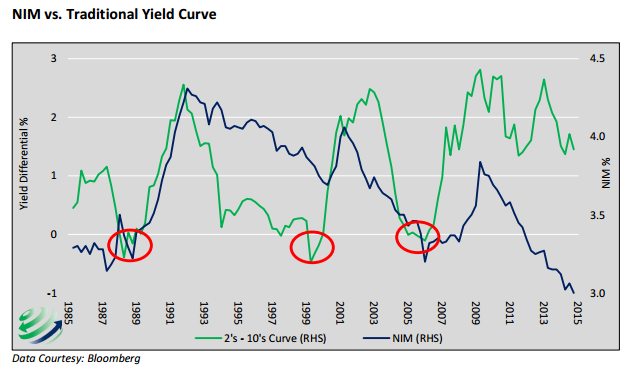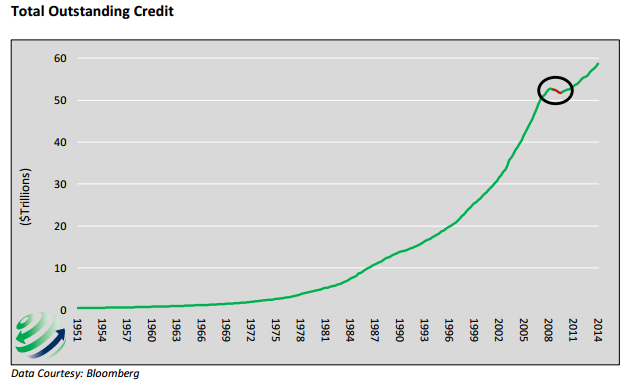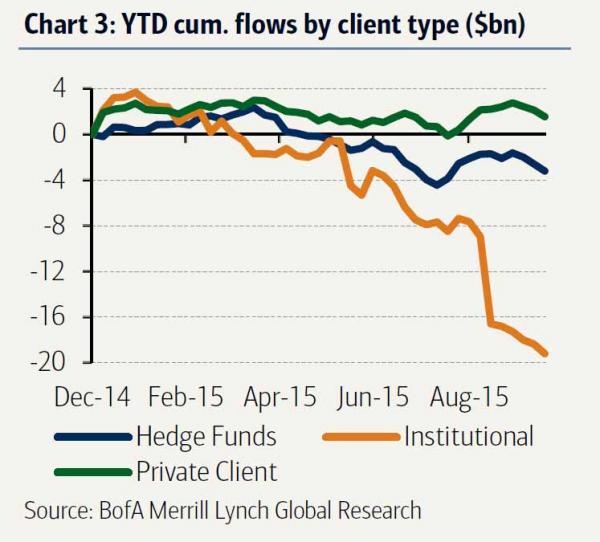The 1998 Profits Recession
I recently noted the importance of the current profits "recession" as it relates to potential market outcomes for investors.
"To me, the pre-conditions for this profits recession speak to downside risk, both for risk assets and for the real economy. None of the data speaks to recession in the real economy right now. We are seeing a slowing of job growth and likely of trend economic growth as well. But with a profits recession hitting, the potential for further downside is high."
Since earnings, and ultimately profits, are derived from underlying economic activity it only makes sense that profits would be a leading indicator of deteriorating economic activity. However, could the recent decline in profits be a "false flag?"
Sam Ro recently discussed this idea stating:
Corporate profits have been lackluster lately, with growth flattening out and turning negative. Declining profits typically signal that an economic recession is in our midst. But not always.
More and more analysts are coming out arguing that this could be one of those corporate profits recessions that don't coincide with economy-wide recessions.
As Jim O'Sullivan writes: 'Profits recessions are usually associated with recessions for the economy as a whole, so the data are certainly attention-grabbing. There have been exceptions, however -- most notably the 1998 period we have been highlighting as fairly analogous to the current time.
Back then, global growth and exports weakened significantly, oil and other commodity prices fell sharply and the dollar surged, yet overall U.S. growth remained solid. Strength in domestic demand offset weakness in foreign demand, as we illustrate in the chart.'"
There are just two problems with Jim O'Sullivan's comments when it comes to investors.
First, the 1998 "profits recession" did not immediately result in an economic recession and coincident "bear market", it was merely postponed as the market "melted up" in the midst of the dot-com bubble. In the short-term investors made gains, but the subsequent collapse wiped them out and more.
Secondly, while there was a "profits" recession in 1998, there was not an "earnings" recession. As shown in the chart below, earnings (both operating and reported) remained stable.
It was the "earnings recession" that signaled the onset of the "bear markets" and recessions in 2001 and 2007. Much to the degree that we see today.
While Sam is correct that this could be a 1998 style "profits recession," there are many fundamental differences between today and then. More importantly, the issue for investors, both then and today, is not paying attention to the "warning signs."
"The point here is simple. No professional or successful investor every bought and held for the long-term without regard, or respect, for the risks that are undertaken. If the professionals are looking at "risk" and planning on how to protect their capital from losses when things go wrong - then why aren't you?
Exactly how many warnings do you need?"
Is "Net Interest Margin" Signaling Economic Weakness
Positive rate spreads have been continuously identified as a sign the economy is not entering a recessionary environment. But given the artificial suppression of interest rates at the long-end of the curve, could rate spreads be misleading this time.
Micheal Lebowitz at 720 Global recently discussed this idea and looked at alternative measures to rate spreads as a "recession indicator." To wit:
"In the world of a zero interest rate policy, NIM may be a more valid indicator of future economic activity. In other words, economic forecasts based on the shape of the traditional curve may not be as relevant given the unprecedented monetary policy actions of the Fed.
Very low levels of interest rates are squeezing bank profits which is one of the key drivers of lending activity and a primary determinant of economic activity. Growth of the U.S. economy, even at today's below trend pace, is more dependent than ever on a continuation of credit growth.
If bank lending activity is challenged as a result of declining NIM, it would stand to reason that NIM may serve as a useful indicator of potential economic weakness. The graph below serves as a reminder of what happened the only time credit growth declined in the last 65 years -- the U.S. experienced the largest financial crisis since the Great Depression."
Micheal's point is correct. Historically, yield spreads have been a good determinate of economic strength or weakness. However, in an environment where they are being artificially suppressed to support economic growth by pulling forward future consumption, the reliability becomes much more questionable.
The problem for the Fed, and why they can't raise rates, is that a tightening of monetary policy will quickly collapse yield spreads and negatively impact economic growth by raising borrowing costs at a very inopportune time. The only reason for raising rates is to provide clearance above ZERO to reload the "policy gun" prior to the onset of the next recession. And given historical tendencies, that event is likely closer than most believe.
You Should Buy, Professionals Need To Sell
Every day when you flip on the media, there is someone telling you that now is the time to "buy" into the market. Of course, if you are buying, then who is selling?
BofA (N:BAC), courtesy of ZeroHedge, recently produced a very interesting chart that explains much of the price action of the market since the beginning of the year.
As you will notice the only "net buyers" of equities have been "individuals," while "professional" firms have been "net sellers." This is the epitome of the classic "smart money/dumb money" analysis where individuals are used by institutions to offload positions that are no longer optimal.
The question is with corporate profits and earnings declining, weak economic data, and the threat of tighter monetary policy -- will individuals once again be left "holding the bag" while institutions de-risk portfolios in advance of the next decline?

